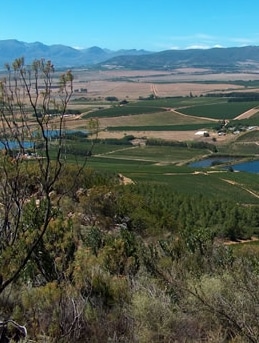Tim James: On the demise of the Biodiversity & Wine Initiative
By Christian Eedes, 23 March 2015
One of the more pleasing things about South Africa’s generic marketing in the last decade has been the Biodiversity and Wine Initiative (associated with the World Wildlife Fund). It’s gone far beyond public relations bluff and has achieved significant gains: many farmers have been encouraged to adopt biodiversity-friendly practices and also to set aside areas of wine-farms for conservation, in the world’s richest plant kingdom. Viticulture tends to produce bleak monocultures, but the BWI has seen heartwarming, proud announcements by wine farms of their little (or large) bits of preserved wetlands, or of a few (or many) hectares of restored fynbos.
There are 175 members of the BWI, and its website currently announces that “Over 140 000 hectares of natural area have been conserved by BWI producers since project inception.… For every hectare under vineyard, an additional hectare of natural vegetation is committed to conservation – and this figure continues to grow.”
Great – who can’t like that, or understand it?
Well, it seems that some care less. The February issue of the BWI newsletter includes a convincing account of how much has been achieved by the BWI in ten years, as well as a rather bland and obscured announcement that it’s all coming to an end. Well, not an end let’s hope, but it’s clearly a bad day. In ghastly business-PR-speak, the newsletter says that “we will be using 2015 to transition away from the BWI membership model and work closely with industry to reposition our members on the existing Sustainable Wine South Africa (SWSA) platform”.
There’s also the statement that “the pressure of resourcing this model of BWI continues to be the major challenge to effectively service members”. I’m guessing that an English translation of this would be that there’s no longer funding available for the Initiative. (Though the nature of that funding is not made clear.)
I contacted WOSA (Wines of South Africa), who’ve actively marketed Cape wines from a “natural” angle (though “variety is in our nature” no longer seems as important a slogan – I always rather liked it). Apparently a media release will be, somewhat belatedly, coming out this week. I hope that it will have some good news to temper the bleak stuff.
According to the BWI, emphasis now will be on the Sustainable Wines of South Africa seal; and the World Wildlife Fund “will actively promote the SWSA seal to markets and consumers as the most sustainable choice for consumers”.
Yes, well. You can read more about the SWSA seal here if you wish. It’s never been something that excited me much since I found out how the overwhelming majority of Cape wines already qualify, and I simply don’t believe the whole industry is environmentally responsible: once an award is almost universal, with low standards, it ceases to be useful. While it’s actually nice to know that a small estate or grape-farm is putting effort into preserving a few hectares of renosterveld or wetland, do I really immediately care that the seal guarantees “that the wine complies with Integrated Production of Wine (IPW) criteria”?
Perhaps the demise of the BWI is not more than sad in a minor way. Perhaps the industry as a whole does care about the environment. Perhaps…. What is Vinpro’s attitude to all this – given that Vinpro is about as close as the industry manages to get to having some leadership?
Meanwhile I’m left ruminating on the idea that the BWI collapsed because of a lack of sponsorship, as well, perhaps, as a lack of commitment. Wouldn’t it be nice if the banks, for example, put some of their ill-gotten gains into real stuff like this instead of into silly, showy competitions that merely enrich organisers and give different wines turns at getting gold medals?
- Tim James is founder of Grape.co.za and contributes to various local and international wine publications. He is a taster (and associate editor) for Platter’s. His book Wines of South Africa – Tradition and Revolution appeared in 2013.









Comments
0 comment(s)
Please read our Comments Policy here.